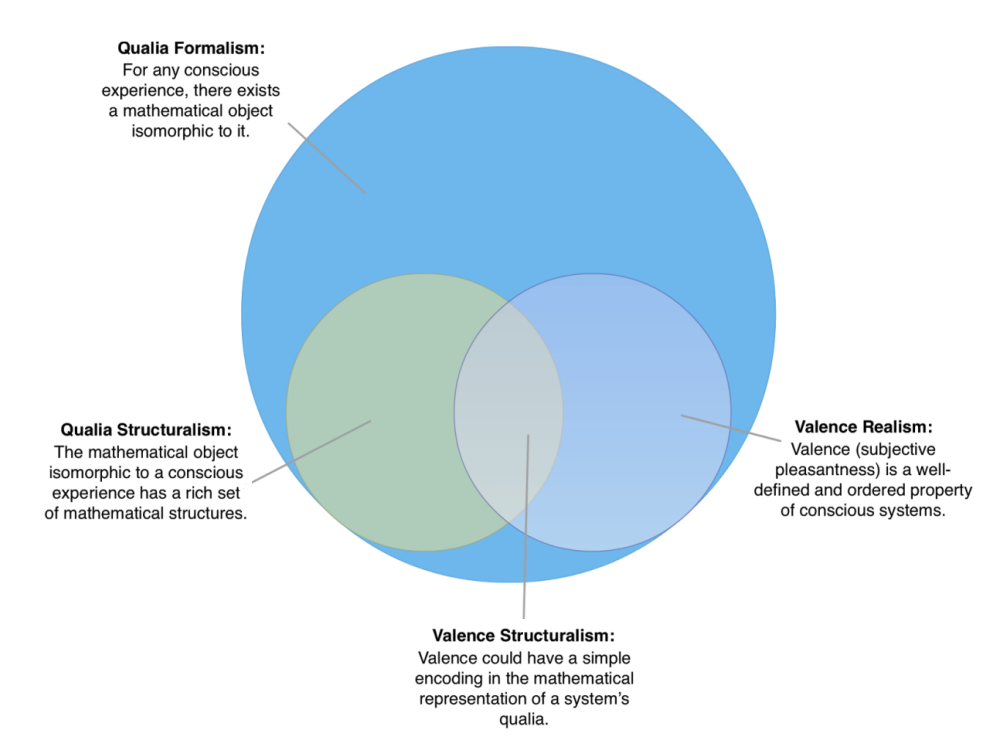Philosophical Foundations / how we think about qualia:
Our starting point is Qualia Formalism, the hypothesis that the internal structure of our subjective experience can be represented precisely by mathematics. Most theories of consciousness are ambiguous on this topic, and we think this is holding back progress: by being clear on whether Qualia Formalism is true or false provides clarity on what kind of problem consciousness is.
A core bottleneck in consciousness research is identifying natural kinds, or determining what the primitive elements of phenomenal experience are. We reject most of the usual starting points (beliefs, preferences, sensations) as fuzzy abstractions, too ambiguous to use as a foundation. Instead, we take the perspective of Valence Realism, that pain and pleasure are not only of particular moral and practical importance but are plausibly fundamental to consciousness and the most tractable place to start reverse-engineering phenomenology. The ‘C. elegans' of qualia.
The simple combination of these two assumptions is surprisingly powerful: if consciousness is representable by mathematics, and emotional valence is a natural kind, then emotional valence should have a clean signature in this mathematical representation. Much of our work (such as the Symmetry Theory of Valence) flows from this.

Neuroscience / how we think about the brain:
Traditionally, neuroscience has been concerned with cataloging the brain, e.g. collecting discrete observations about anatomy, observed cyclic patterns (EEG frequencies), and cell types and neurotransmitters, and trying to match these facts with functional stories. However, it's increasingly clear that these sorts of neat stories about localized function are artifacts of the tools we're using to look at the brain, not of the brain's underlying computational structure.
What's the alternative? Instead of centering our exploration on the sorts of raw data our tools are able to gather, we can approach the brain as a self-organizing system, something which uses a few core principles to both build and regulate itself. As such, if we can reverse-engineer these core principles and use what tools we have to validate these bottom-up models, we can both understand the internal logic of the brain's algorithms — the how and why the brain does what it does — as well as find more elegant intervention points for altering it [see more on our Lineages page].
What does this have to do with consciousness? In short, if we can understand the structure of the way the brain processes information, and phenomenological content is deeply coupled to the information the brain is processing, we can use this knowledge to build useful proxies for what's happening in phenomenology.
Neurotechnology / blueprints for useful devices and methods:
The purpose of research is to make the world better: to make real things that help people. We have some early-stage neurotech projects in progress and are always looking for collaborators.
Vision / significance of our research:
We believe understanding consciousness is one of the most important and pressing tasks for humanity: an enabling condition for fixing many problems of the present and for building good futures.
On a personal scale, there's a great deal of suffering in the world, and understanding what suffering is seems crucial for reducing it. Second, there's a saying in business that ‘what you can measure, you can manage' — and so progress on understanding the structure of phenomenology and nature of suffering should lead to better interventions for mental health.
It's also important to note that if we have good first-principles metrics for mood in humans, we can apply them to non-human animals as well, putting animal welfare on a much more quantitative basis.
On a civilizational scale, we seem to be gripped by nihilism, confusion about what futures are worth working toward, and trouble coordinating society toward any goal at all. These questions become all the more pressing as developments in artificial intelligence, genetic engineering, and neurotechnology allow deeper forms of self-authorship. We believe understanding the structure of phenomenology, and the nature of phenomenological value, could help navigate this.